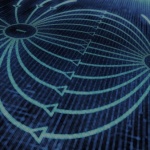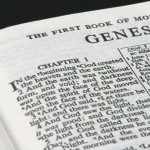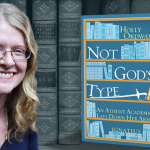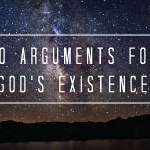Philosophy in the Eyes of Theologians: Friend or Foe? (Part 2 of 3)
by Tamer Nashef
Filed under History, Religion
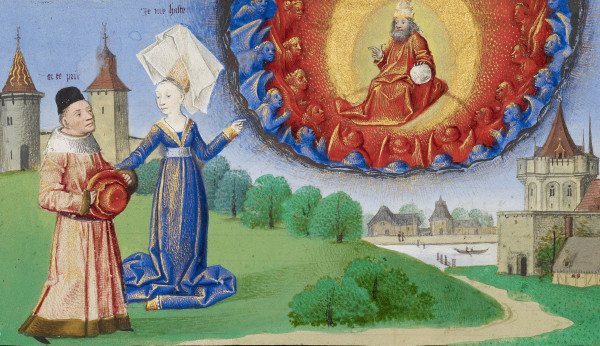
NOTE: Today we continue our three part series from Tamer Nashef on the relationship between philosophy and theology. Tamer's previous piece at Strange Notions, "I’m a Muslim But Here’s Why I Admire the Catholic Church", remains one of our all-time most popular posts.
The first part of the essay set forth the attitude of the Christian theologians of Late Antiquity toward reason and pagan philosophy. We noted that they viewed reason and philosophy as “handmaidens” to faith. The second part will focus on medieval theologians.
Boethius (480-524) was a Roman aristocrat living at a time when knowledge of the Greek language and the Classical tradition was in short supply in the West as a result of the Barbarian invasions and collapse of the Western Roman Empire. Unlike most of his contemporaries, Boethius knew Greek and set out to provide Latin translations of the Aristotelian and Platonic corpus. His premature death as a result of execution at the hands of the Ostrogothic King Theodoric on charges of treason prevented him from completing his task but he did manage to translate some of Aristotle’s treatises on logic. These translations in addition to Boethius’ own commentaries and works on logic came to be known as the “old logic” and “served as a major source of intellectual activity during the darkest days of Western civilization, between the sixth to eleventh centuries” (Grant’s Science and Religion 140).
Contrary to the caricature of the theologian who eschews the use of reason and logic and merely appeals to Scriptural authority, Boethius “insisted on applying logic and reason to theological problems,” including the Trinity and the apparent tension between divine foreknowledge and human free will (140). He perceived the application of reason and logic to theology as essential and “began a trend that would revolutionize Christian theology and transform it into a rationalistic and analytical discipline…” (141).
The Consolation of Philosophy, a treatise Boethius composed in prison while awaiting execution and which takes the form of a dialogue with Lady Philosophy, was the most popular work throughout the Middle Ages after the Bible. In said work, he reveals clear Platonic influences, as he argues that God is synonymous with “Goodness” because the “substance of God consisteth in nothing else but goodness” (Stokes 47). It follows that every good man somehow participates in or reflects God’s “Goodness” and divinity – an argument clearly reminiscent of Plato’s theory of Forms or Ideas (47).
Boethius also addressed the problem of free will and determinism, according to which if God as an omniscient creator has foreknowledge of our future actions, we are left with no free will, as our course of action appears to have been determined in advance. This begs the question of why God would punish us for actions we are not responsible for. Boethius came up with what I would describe as an ingenious philosophical solution to this perennial problem. He places God outside the flow of time, arguing that God lives in the eternal present and views all past, present, and future actions in the same way the way we know the present. In other words, God sees our future actions without interfering (thus preserving human free will), in the same way I am seeing that my cat is sitting on the couch in front of me without interfering in the cat’s free choice to take this particular course of action (Buckingham 74-5).
Like many other Church Fathers, Byzantine monk and priest John of Damascus (675 or 676 –749) viewed philosophy favorably and asserted that “the best contributions of the philosophers of the Greeks” were “given to men from God above” (Grant’s Science and Religion 110). He also placed a high value on knowledge and felt nothing but scorn for ignorance: “Nothing is more estimable than knowledge, for knowledge is the light of the rational soul. The opposite, which is ignorance, is darkness. Just as the absence of light is darkness, so is the absence of knowledge a darkness of the reason. Now, ignorance is proper to irrational beings, while knowledge is proper to those who are rational” (110). He extolled philosophy as “the art of arts and the science of sciences,” and countered claims denying its very existence: “There, are, however, some people who have endeavored to do away entirely with philosophy by asserting that it does not exist and that neither does any knowledge or perception exist. We shall answer them by asking: How is it that you say that there is neither philosophy, nor knowledge, nor perception? Is it by your knowing and perceiving it, or is it by your not knowing and perceiving it? But if it is by your not knowing it, then no one will believe you, as long as you are discussing something of which you have no knowledge” (110-1).
Next comes Scotus Erigena (810-877), indisputably one of the greatest Christian philosophers in the Early Middle Ages and one of the towering figures of the Carolingian Renaissance. Erigena served in the court of the Carolingian King Charles the Bald of France. He knew Greek (a unique skill in the West at the time) and used his linguistic privilege to bring forth Latin translations of the Greek works of Dionysius the Areopagite (an anonymous Christian Neo-Platonist) and other Greek Church Fathers. Erigena, also known as John the Scot, authored On the Division of Nature, a neo-Platonic philosophical work in which he divides nature into (1) nature creating and uncreated (God) (2) nature created and creating (the Platonic Ideas) (3) nature created and uncreating (animals, plants, rocks, or the everyday world seen and felt in space and time) and finally (4) nature uncreated and uncreating (a return to the uncreated God but this time as the end to which all things return). In addition, Erigena argued that God is indescribable in human language and it would be even more accurate to say God does not “exist” in the sense that He is beyond and above existence. He concludes, therefore, that Biblical passages on God should not be taken literally, stressing that each Biblical verse has multiple meanings (Kenny 115-6).
In line with the thought of many Christian theologians, Erigena held reason in high regard, enshrined it as the highest arbiter, and went as far as subordinating authority to it: “For authority proceeds from true reason, but reason certainly does not proceed from authority. For every authority which is not upheld by true reason is seen to be weak, whereas true reason is kept firm and immutable by her own powers and does not require to be confirmed by the assent of any authority. For it seems to me that true authority is nothing else but the truth that has been discovered by the power of reason and set down in writing by the Holy Fathers for the use of posterity” (Grant’s Science and Religion 148). A poignant passage indeed, which refutes the deeply entrenched falsehood that Catholic theologians have always been inimical to reason.
Rise of Reason, Cathedral Schools in Europe
At the turn of the first millennium, Latin Christendom was on the cusp of monumental changes that would drastically alter the course of its intellectual history and pave the way for its primacy in science, technology, and economy from the late Middle Ages onwards. These fundamental changes involved technological and agricultural developments (such as the introduction of the three-field crop rotation system), a subsequent increase in agricultural output and food supply, a population explosion, relative political stability (after centuries of persistent invasions by Barbarians, Vikings, Arabs), and the growth of commerce. This period also witnessed the re-urbanization of Europe (after centuries as a rural backwater) and the construction of cities. These developments in turn led to the rise of cathedral and urban schools (later evolved into universities) as major intellectual centers in cities such as Paris, Orleans, Toledo, Chartres, Cologne, thereby replacing the rural monasteries which had taken upon themselves the preservation of Classical learning and literacy in the wake of the Barbarian invasions. However, the most crucial transformation relevant to our discussion was the renewed confidence in the powers of reason and its application to many activities, including economy, commerce, law, and above all theology (on all these developments see Lindberg’s Beginnings 203-6; Grant’s Foundations of Modern Science in the Middle Ages 19, Science and Religion 146-8).
This remarkable emphasis on reason and logic was manifested in the thought of many Catholic theologians as early as the 10th and 11th centuries, including Gerbert of Aurillac (946-1003), St. Anselm (1033-1109), and Berengar of Tours (1000-1088).
Gerbert of Aurillac, later known as Pope Sylvester II (999-1003), was “the most learned man in Europe of his day,” and his interests spanned a broad spectrum of fields ranging from astronomy, mathematics, philosophy to theology, music, and Latin literature (Woods 22). Gerbert’s thirst for knowledge prompted him to travel to Catalonia (which was contiguous with territories still under Muslim rule) to study mathematics and procure precious manuscripts, and he is considered one of the first Europeans to have introduced Arabic learning in the West, especially the Hindu-Arabic numerals and the abacus (Huff’s Rise of Early Modern Science 50). Lindberg hails Gerbert as “the first, or one of the earliest, and certainly the most important, initiators of fruitful intellectual contact between Islam and Latin Christendom” (Beginnings of Western Science 199). He also won wide acclaim as teacher of the seven liberal arts, especially at the Cathedral School of Rheims, and played a key role in reviving Boethius’ “old logic” and in transforming logic into “a basic subject of study in the cathedral schools of Europe” (Grant’s Science and Religion 149). He further placed a high premium on science and knowledge, stressing that “[t]he just man lives by faith, but it is good that he should combine science with his faith” and that “[t]he Divinity made a gift to men in giving them faith while not denying them knowledge…Those who do not possess it [knowledge] are called fools” (Woods 23).
St. Anselm, the Archbishop of Canterbury, is considered "the father of the Scholastic tradition" (Stokes 48) and "the most important philosopher of the eleventh century" (Kenny 119). While affirming the primacy of faith, Anselm disapproved of a faith that lacked understanding: "It seems to me a case of negligence if after becoming firm in our faith, we do not strive to understand what we believe" (Watson 330). Rather than accept God’s existence solely on the basis of blind faith, Anselm sought to devise rational arguments for the existence of God, one of which is known as the Ontological Argument, without having recourse to revelation. He also came up with a rational argument for the Christian doctrine of Incarnation.
Anselm's basic definition of God, which he says both the believer and non-believer would agree on, is the foundation upon which he constructs his ontological proof. He defines God as "a being than which nothing greater can be thought." God is a perfect being and the greatest entity imaginable or conceivable. It follows that such a being would have to exist because existence is a necessary attribute of perfection. If God didn't exist, He would not be perfect and this would contradict the premise of the argument. Something that exists is surely greater than that which does not. If God is the greatest entity possible then He must exist because otherwise He wouldn't be. In other words, "the existence of God would seem to follow necessarily from the definition. For it would be a contradiction to suppose that God is on the one hand something than which nothing greater can be thought of and on the other hand does not exist" (Stokes 49). Anselm’s argument is by no means airtight, but even the celebrated atheist philosopher Bertrand Russell (1872-1970) admitted that “it is easier to feel convinced that it must be fallacious than it is to find out precisely where the fallacy lies” (Hannam 38).
It is worth pointing out that Anselm felt compelled to provide rational proof of God without appealing to Scripture because his fellow monks had requested such proof. These monks, Anselm said, requested that “nothing in Scripture should be urged on the authority of Scripture itself, but that whatever the conclusion of independent investigation should declare to be true, should, in an unadorned style, with common proofs and with a simple argument, be briefly enforced by the cogency of reason, and plainly expounded by the light of truth” (Grant’s Science and Religion 153). The fact these monks requested reasoned arguments in defense of revealed truths without invoking Scriptural authority speaks volumes about the high status of reason in Catholic theology.
Anselm also set out to provide a reasoned argument in defense of the Incarnation. Adam's original sin was an offense against God and the scale of atonement had to be commensurate with the severity of the offense. Man could not, through his own efforts as a finite being, atone for the infinite sin against God and therefore he needed divine assistance or intervention. Kenny explains: "Satisfaction can only be adequate if it is made by one who is human (and therefore heir of Adam) and one who is divine (and can therefore make infinite recompense). Hence the incarnation of God is necessary if original sin is to be wiped out and the human race is to be redeemed" (121).
Berengar of Tours was undoubtedly a controversial figure who raised alarm among some ecclesiastical quarters for applying reason, which he viewed as a gift from God, to the revealed articles of faith, specifically the doctrine of transubstantiation. He defended his position, however, by asserting that “it is incomparably superior to act by reason in the apprehension of truth; because this is evident, no one will deny it except a person blinded by madness” (Grant’s Science and Religion 152). He also charged that it is man’s rational faculties that essentially make him an image of God: “…to have recourse to dialectic is to have recourse to reason; and he who refuses this recourse, since it is in reason that he is made in the image of God, abandons his glory, and cannot be renewed from day to day in the image of God” (152).
Works Cited
Buckingham, Will, et al. The Philosophy Book: Big Ideas Simply Explained. London: DK, 2011. Print.
Grant, Edward. The Foundations of Modern Science in the Middle Ages: Their Religious, Institutional, and Intellectual Contexts. Cambridge: Cambridge University Press, 1996. Print.
____________. Science and Religion 400 BC- AD 1550: From Aristotle to Copernicus. Baltimore: The John Hopkins University Press, 2004. Print.
Hannam, James. The Genesis of Science: How the Christian Middle Ages Launched the Scientific Revolution. Washington: Regnery Publishing, 2011. Print.
Huff, Toby. The Rise of Early Modern Science: Islam, China and the West. 2nd edition. New York: Cambridge University Press, 2003. Print.
Kenny, Anthony. A Brief History of Western Philosophy. Oxford: Blackwell Publishers, 1998. Print.
Lindberg, C. David. The Beginnings of Western Science: The European Scientific Tradition in Philosophical, Religious, and Institutional Context, Prehistory to A.D. 1450. 2nd edition. Chicago: The University of Chicago Press, 2007. Print.
Stokes, Phillip. Philosophy: 100 Essential Thinkers. New York: Enchanted Lion Books, 2005. Print.
Watson, Peter. Ideas: A History of Thought and Invention, From Fire to Freud. New York: Harper Perennial, 2005. Print.
Woods E. Thomas. How the Catholic Church Built Western Civilization. Washington: Regnery History, 2012. Print.
Related Posts
Note: Our goal is to cultivate serious and respectful dialogue. While it's OK to disagree—even encouraged!—any snarky, offensive, or off-topic comments will be deleted. Before commenting please read the Commenting Rules and Tips. If you're having trouble commenting, read the Commenting Instructions.





